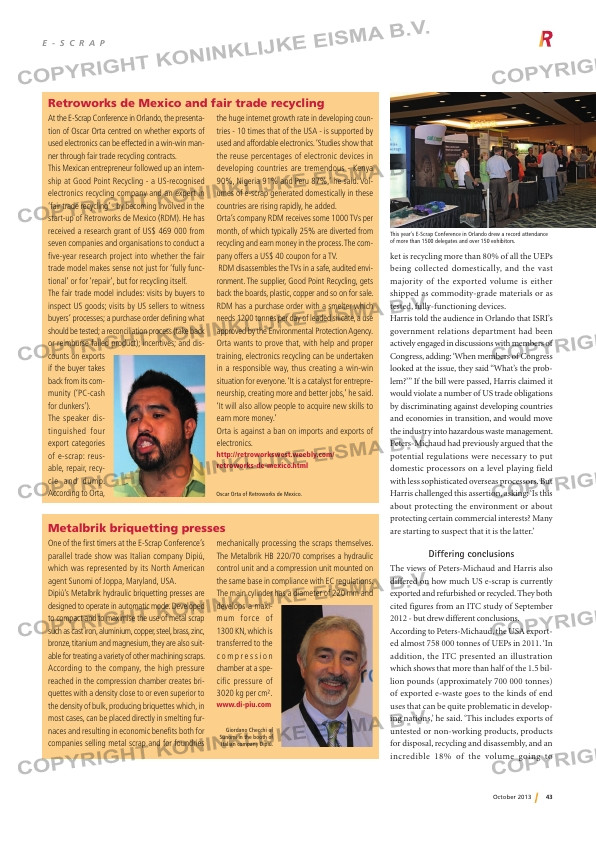Page 43 from: October 2013

43October 2013
E – s c r a p
ket is recycling more than 80% of all the UEPs
being collected domestically, and the vast
majority of the exported volume is either
shipped as commodity-grade materials or as
tested, fully-functioning devices.
Harris told the audience in Orlando that ISRI’s
government relations department had been
actively engaged in discussions with members of
Congress, adding: ‘When members of Congress
looked at the issue, they said “What’s the prob-
lem?’” If the bill were passed, Harris claimed it
would violate a number of US trade obligations
by discriminating against developing countries
and economies in transition, and would move
the industry into hazardous waste management.
Peters-Michaud had previously argued that the
potential regulations were necessary to put
domestic processors on a level playing field
with less sophisticated overseas processors. But
Harris challenged this assertion, asking: ‘Is this
about protecting the environment or about
protecting certain commercial interests? Many
are starting to suspect that it is the latter.’
Differing conclusions
The views of Peters-Michaud and Harris also
differed on how much US e-scrap is currently
exported and refurbished or recycled. They both
cited figures from an ITC study of September
2012 – but drew different conclusions.
According to Peters-Michaud, the USA export-
ed almost 758 000 tonnes of UEPs in 2011. ‘In
addition, the ITC presented an illustration
which shows that more than half of the 1.5 bil-
lion pounds (approximately 700 000 tonnes)
of exported e-waste goes to the kinds of end
uses that can be quite problematic in develop-
ing nations,’ he said. ‘This includes exports of
untested or non-working products, products
for disposal, recycling and disassembly, and an
incredible 18% of the volume going to
At the E-Scrap Conference in Orlando, the presenta-
tion of Oscar Orta centred on whether exports of
used electronics can be effected in a win-win man-
ner through fair trade recycling contracts.
This Mexican entrepreneur followed up an intern-
ship at Good Point Recycling – a US-recognised
electronics recycling company and an expert in
‘fair trade recycling’ – by becoming involved in the
start-up of Retroworks de Mexico (RDM). He has
received a research grant of US$ 469 000 from
seven companies and organisations to conduct a
five-year research project into whether the fair
trade model makes sense not just for ‘fully func-
tional’ or for ‘repair’, but for recycling itself.
The fair trade model includes: visits by buyers to
inspect US goods; visits by US sellers to witness
buyers’ processes; a purchase order defining what
should be tested; a reconciliation process (take back
or reimburse failed product); incentives; and dis-
counts on exports
if the buyer takes
back from its com-
munity (‘PC-cash
for clunkers’).
The speaker dis-
tinguished four
export categories
of e-scrap: reus-
able, repair, recy-
cle and dump.
According to Orta,
the huge internet growth rate in developing coun-
tries – 10 times that of the USA – is supported by
used and affordable electronics. ‘Studies show that
the reuse percentages of electronic devices in
developing countries are tremendous – Kenya
90%, Nigeria 91% and Peru 87%,’ he said. Vol-
umes of e-scrap generated domestically in these
countries are rising rapidly, he added.
Orta’s company RDM receives some 1000 TVs per
month, of which typically 25% are diverted from
recycling and earn money in the process. The com-
pany offers a US$ 40 coupon for a TV.
RDM disassembles the TVs in a safe, audited envi-
ronment. The supplier, Good Point Recycling, gets
back the boards, plastic, copper and so on for sale.
RDM has a purchase order with a smelter which
needs 1200 tonnes per day of leaded silicate, a use
approved by the Environmental Protection Agency.
Orta wants to prove that, with help and proper
training, electronics recycling can be undertaken
in a responsible way, thus creating a win-win
situation for everyone. ‘It is a catalyst for entrepre-
neurship, creating more and better jobs,’ he said.
‘It will also allow people to acquire new skills to
earn more money.’
Orta is against a ban on imports and exports of
electronics.
https://retroworkswest.weebly.com/
retroworks-de-mexico.html
Retroworks de Mexico and fair trade recycling
Oscar Orta of Retroworks de Mexico.
One of the first timers at the E-Scrap Conference’s
parallel trade show was Italian company Dipiú,
which was represented by its North American
agent Sunomi of Joppa, Maryland, USA.
Dipiú’s Metalbrik hydraulic briquetting presses are
designed to operate in automatic mode. Developed
to compact and to maximise the use of metal scrap
such as cast iron, aluminium, copper, steel, brass, zinc,
bronze, titanium and magnesium, they are also suit-
able for treating a variety of other machining scraps.
According to the company, the high pressure
reached in the compression chamber creates bri-
quettes with a density close to or even superior to
the density of bulk, producing briquettes which, in
most cases, can be placed directly in smelting fur-
naces and resulting in economic benefits both for
companies selling metal scrap and for foundries
mechanically processing the scraps themselves.
The Metalbrik HB 220/70 comprises a hydraulic
control unit and a compression unit mounted on
the same base in compliance with EC regulations.
The main cylinder has a diameter of 220 mm and
develops a maxi-
mum force of
1300 KN, which is
transferred to the
c o m p r e s s i o n
chamber at a spe-
cific pressure of
3020 kg per cm².
www.di-piu.com
Metalbrik briquetting presses
Giordano Checchi of
Sunomi in the booth of
Italian company Dipiú.
This year’s E-Scrap Conference in Orlando drew a record attendance
of more than 1500 delegates and over 150 exhibitors.
p00_E-srap.indd 43 03-10-13 10:58



